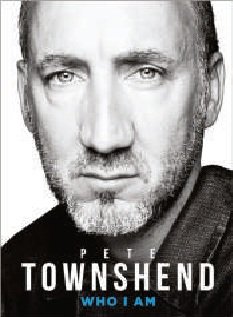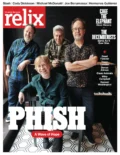
Oh, what a mess.
Not Pete Townshend’s new autobiography Who I Am – it’s well-written and an engaging read. The mess I’m referring to is the story told on the pages of Who I Am, which would be the story of Pete Townshend’s life … which, I guess, would be the roundabout way of saying that Pete Townshend’s life has been a mess.
Surprised? Why should we be? Townshend has made a career of shining the harsh light on life’s warts, goiters and carbuncles – much of the stuff that one doesn’t want to acknowledge, much less talk about – putting it to music, and turning the weird shit into anthems of pop culture with killer guitar parts. The fact that Townshend’s life story itself is chock full of that same weird shit (pick your struggle; chances are good Townshend has at least arm-wrestled it himself) shouldn’t be a forehead-slapper.
It’s unsettling to think that we may have young Pete’s time spent in the care of his twisted grandmother Denny – and her revolving cast of paramours – to thank as the inspiration for the darker moments of his work, including “Uncle Ernie” from Tommy. Denny does get points for providing the lad with his first guitar: one that “she saw hanging from the wall of a restaurant, whose owner was a friend of hers. It was an awful instrument … but I was delighted. After I got it correctly strung, I started learning a few chords. Within minutes three strings had broken and the neck of the guitar started to bend, but I just reduced the tension and made do with the three remaining strings.” And so it began.
The substance abuse; the often wretchedly-excessive rockstar lifestyle; the internal conflicts among the members of The Who; the marital turmoil; 2003’s child pornography scandal (Townshend, a longtime supporter of NAPAC [National Association for People Abused in Childhood] says he’s a victim of his own “White Knight Syndrome”). It’s all here. The sensational stuff is handled matter-of-factly and the deeply personal stuff is offered up openly and without excuses. And along the way, you realize that we already know much of this story solely from the music that Townshend’s been making for nearly 50 years.
As reckless and self-destructive as The Who seemed to be back in the day, there was still an air of awareness about Townshend. The fact that he chose to keep an unopened letter from a fan written back in January of 1967 (he shares the present-day unsealing with us in the appendix) tells that there was at least an assumption of posterity – a career (and a life) that would last long enough to be worthy of reflection. “Hope I die before I get old” – really? Really? Reading Who I Am leads you to believe that if Townshend truly felt that way, it may have had to do more with the prospect of lugging around his personal inner turmoil for any length of time rather than the reluctance to deal with the standard burdens of maturity.
One of the most settled moments in the book – a glimpse into what might be defined as Townshend’s modern-day hard-won inner peace – comes at the very end, on the “coda” page. Townshend writes:
I dedicate this book to the artist in all of us.
This is as much a note to myself as one to you. Play to the gods! In showbusiness (sic) the ‘gods’ are the seats right at the back of the theatre, the tough ones, where people got in cheaply and can’t see or hear properly, and chat between themselves and eat lots of popcorn.
For the artist ‘the gods’ is the universe, the big, abstract picture, the unknown, the open sky and sea. Focusing on the infinite universe might seem rather grandiose, or utterly aimless. In fact it’s as small or as large as we want it to be. Some of us believe there is nothing out there. Some of us believe we are surrounded by attentive angels. Whatever.
Play to the gods, or – if you prefer – to a small basket full of stuffed toys, or sing into the mouth of a hot-water bottle, or turn the knobs on a chest of drawers and pretend to be 20,000 leagues under the sea.
It’s all the same thing. If in doubt, just play.
Even though the name of the book isn’t a question, Pete Townshend claims in its pages “I’m still trying to find out who I am.” He’s tilled up some odd-smelling sod in the telling of his tale – one can only hope there’s some closure that comes from it.
In the meantime, just know that the silences on Live At Leeds come from those times when Pete Townshend’s windmilling arm was high in the air – and the anger, hurt, confusion, and self-doubt that fueled that arm was even more powerful than the stacks of Marshalls in the background.
Luckily for us, he just played.



No Comments comments associated with this post